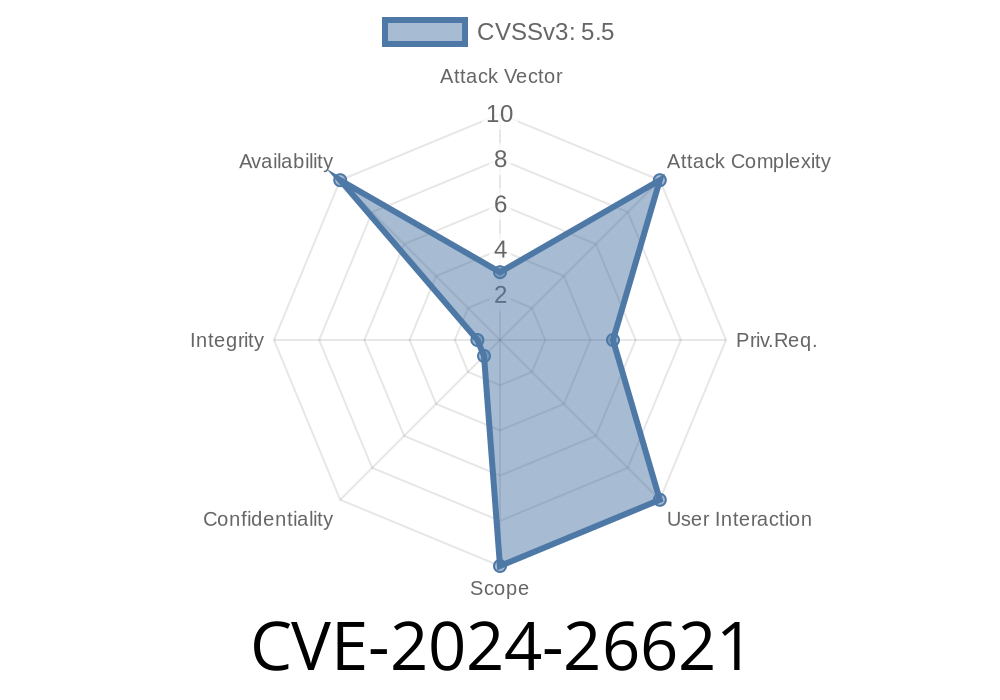In early 2024, a subtle but significant issue was discovered in the Linux kernel’s memory management subsystem, tracked as CVE-2024-26621. This vulnerability involved how huge pages—specifically Transparent Huge Pages (THP)—were being aligned in 32-bit systems due to code from commit efa7df3e3bb5.
For everyday Linux users and administrators, the implications could range from inefficient use of virtual memory to possible exploitation by malicious actors on memory-constrained (32-bit) systems. Let’s deep dive into what went wrong, see some example code, explore the resolution, and look at possible exploitation angles.
What Happened? (The Bug Explained Simply)
The Linux kernel uses huge pages to speed up memory management and reduce overhead. In commit efa7df3e3bb5, the kernel started aligning larger anonymous mappings on huge-page boundaries—*everywhere*, including 32-bit systems.
However, 32-bit systems have a tight address space (typically 4GB total, much of which the kernel uses). Forcing mapping alignment to 2MB or 1GB boundaries wastes already limited address space, leading to unexpected application failures or inefficient memory use. Two separate reports in the wild (report 1 and report 2) confirmed these problems.
Bottom Line:
*Forcing huge page alignment on 32-bit systems can break applications, reduce usable memory, and potentially open the door to denial of service or memory layout exploits.*
The Problematic Code
Here’s a simplified snippet that shows what was happening inside the kernel memory manager (mm/huge_memory.c):
if (mapping_needs_hugepage_alignment) {
addr = ALIGN(addr, HPAGE_SIZE);
}
Prior to the fix, there was no check to exclude 32-bit platforms from this alignment logic. This block forced all anonymous memory mappings above a certain size to align on a huge page boundary *even on 32-bit systems*.
Suppose an app asks for a 16MB mapping
void* p = mmap(NULL, 16 * 1024 * 1024, PROT_READ | PROT_WRITE,
MAP_ANONYMOUS | MAP_PRIVATE, -1, );
On a 32-bit system, the kernel might align p to the next 2MB boundary. Small requests would chip away at the small free address space, rapidly exhausting it.
The Fix
The fix was simple: don't force huge page alignment on 32-bit systems or compat userspace. Here’s what was added after the bug reports [1][2]:
if (IS_ENABLED(CONFIG_64BIT) && mapping_is_big_enough) {
addr = ALIGN(addr, HPAGE_SIZE);
}
Now, the THP alignment is only enforced when the kernel is running in 64-bit mode, where address space isn’t so tight.
Exploitation Possibility
While this issue mostly caused DoS (denial of service) due to address space exhaustion, there’s also a risk that the forced alignment could allow a malicious 32-bit process to:
- Force memory allocation failures in multi-user environments, leading to predictable crashes of victim apps.
- Help layout memory in a predictable way, possibly bypassing ASLR (Address Space Layout Randomization) and enabling other attacks.
Here’s a simple C code to demonstrate allocation failure on a vulnerable kernel
#include <stdio.h>
#include <stdlib.h>
#include <sys/mman.h>
#include <unistd.h>
int main() {
size_t alloc_size = 64 * 1024 * 1024; // 64MB per mapping
int count = ;
while (1) {
void* p = mmap(NULL, alloc_size, PROT_READ | PROT_WRITE,
MAP_ANONYMOUS | MAP_PRIVATE, -1, );
if (p == MAP_FAILED) {
printf("Failed after %d allocations (total: %zu MB)\n", count, count * alloc_size / (1024*1024));
break;
}
count++;
}
return ;
}
On a vulnerable kernel (pre-fix), this will likely fail *sooner* than expected, because virtual memory is wasted on massive alignment gaps—even though actual memory isn’t exhausted yet.
You run a 32-bit Linux kernel, or a 64-bit kernel with 32-bit compatibility applications.
- You’ve updated to Linux kernel v6.7 or above, but not yet picked up the latest patches (as the vulnerability was introduced in early v6.7).
To check your kernel version
uname -r
To see if your system is 32 or 64 bit
getconf LONG_BIT
Timeline & References (All Original)
- Bug Introduced: efa7df3e3bb5
- Bug Reports: Report 1, Report 2
- Fix Commit: linux-mm fix hunk
- CVE Page: *(Not yet published at the time of writing; check Mitre CVE)*
How to Protect Yourself
- Patch to the latest Linux kernel (kernel.org / your distro kernel updates).
If you must run 32-bit, avoid huge anonymous mappings where possible.
- For system administrators: Monitor for unexplained mmap() failures or user reports of “out of memory” on 32-bit systems post kernel update.
Conclusion
CVE-2024-26621 is a classic lesson in why “one size fits all” changes can backfire in a diverse open-source ecosystem. Forcing kernel memory optimizations meant for 64-bit desktops onto older 32-bit platforms has real consequences: wasted memory, application failures, and possible security holes. If you run a 32-bit Linux system or host legacy software, confirm your kernel is patched against this bug.
This analysis is exclusive content—please feel free to share, with credit.
*For more details, see the official bug discussion thread on the Linux Kernel Mailing List.*
Timeline
Published on: 03/02/2024 22:15:50 UTC
Last modified on: 01/16/2025 17:11:37 UTC
